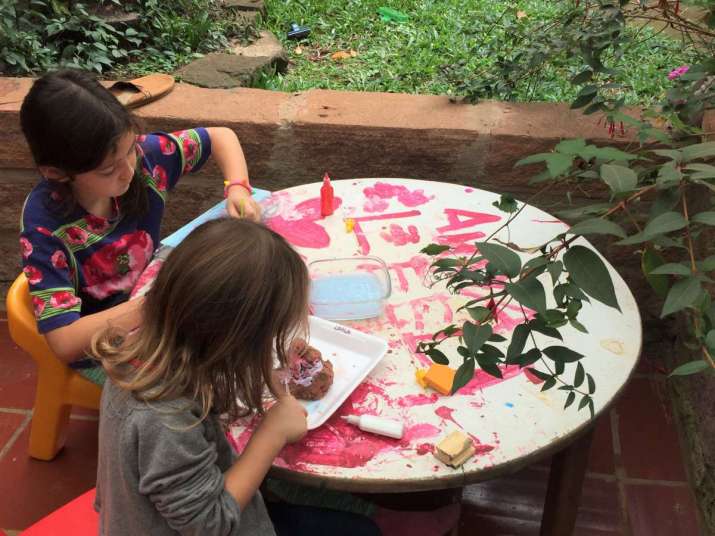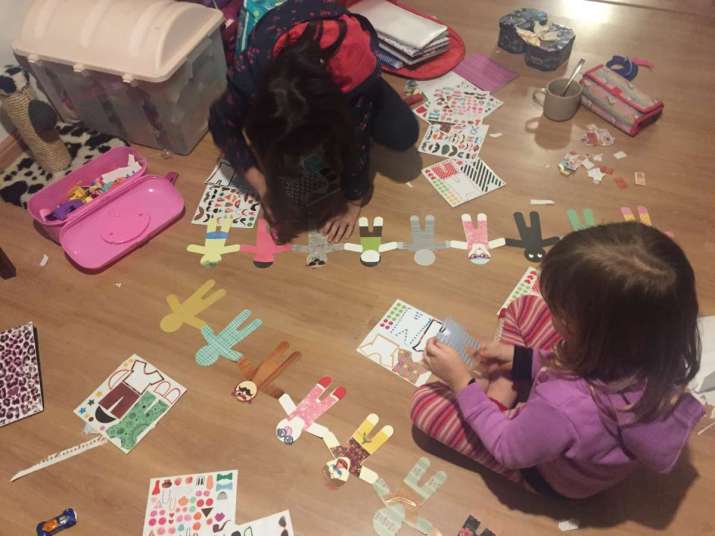FEATURES|COLUMNS|Buddhist Parenting (inactive)
Maintaining Joy and Inspiration as Parents
 Amaya and Leela playing together. Image courtesy of the author
Amaya and Leela playing together. Image courtesy of the authorMaintaining joy and being playful with our children is easy enough when they are chubby little babies, but sometimes, as they get older and the daily routine begins to include homework, school lunches, after-class activities, dentist appointments, and the mundane humdrum of our increasingly busy schedules . . . sometimes I forget to enjoy being a parent. Sometimes I let an entire day pass in a state of obligatory “parent mode,” trying to be the grown-up and forgetting to simply feel joy in the present moment. It is only when my children are peacefully asleep at the end of the day and I look at their sweet slumbering faces that I remember. It is in these quiet interludes that the wonder and the magic of precious human life becomes vividly apparent, reminding us how joyful it is to be a parent. In that strange mixed sense of bliss and sadness, we also sense how fast time is hurtling forward.
After the exhaustion of keeping up with a toddler eases, I began to experience impermanence more directly. It is no longer just a theoretical statement from a smiling grandmother admiring your children; it is a somewhat jarring reality. Time does pass quickly, and our children grow up in a flash. This sense makes the importance of maintaining joy within the home and finding joy in every stage of parenting more evident for me. How often do I find myself missing a chance of joy or play just because I am too distracted by my own thoughts, caught up in memories of the past, or in worries about the future?
I recall seeing a lovely video clip of a group of children having an audience with Dzongsar Jamyang Khyentse Rinpoche, in which Rinpoche encouraged the children to play as much as possible. It was such a sweet video and it really struck me. It made me reflect on the demands I make: “Sit up straight at the table;” “Eat with your mouth shut;” “You’re making too much noise;” “Say hello;” “Slow down;” “Speed up, we’re late!” When did parenting become so mechanical? I began to realize that I wasn’t being a playful parent anymore; I had lost the silliness.
Children learn through play. I think we must educate our children with joy, letting them teach us how to get back in touch with a less inhibited and more youthful nature. I write this as a reminder to myself. Other mother friends have also shared that it can be hard to make time to play with their children. The first time I tried to play, it felt somewhat forced. I remember thinking “okay, now play, you need to play more.” I tend to shower my girls with lots of attention, but I am not very playful—my husband is more so. Maybe I was tired. I started consciously trying to be less serious and rather than force myself to play more, I began to allow myself. When I sit on the floor with my daughters and make up a game with their dolls or their paints, and let myself be silly and imaginative, it makes them so happy. We all really enjoy each other’s company. But on a deeper level, playing reacquaints us with our spontaneity, our creativity, and our loving nature.
 Amaya and Sophia playing. Image courtesy of the author
Amaya and Sophia playing. Image courtesy of the authorAnother time that brings us joy is storytime. When studying the Dharma, reading the stories of practitioners from the past and stories of great bodhisattvas has always brought me inspiration and joy. So, besides the regular reading time with my daughters, I like to tell them these stories. I tell them of the aspirations of the great bodhisattvas, such as Tara, who aspired to attain enlightenment in the form of a female. Through these stories the children gain an understanding of the lasting effect of aspirations and good wishes, and they gain a feeling for the intentions of the bodhisattvas.
I love telling them bedtime stories as they drift off to sleep all cuddled up in their blankets. There is this lovely phase in which children like to hear the same story or read the same book over and over. When Amaya was four years old, I remember improvising a story with a description of how Samye Monastery in Tibet was built. I emphasized King Trisong Detsen’s motivation, Shantaraksita’s knowledge, and Guru Rinpoche’s blessings as he tamed the obstacle makers who then became helpers. That first evening I was falling asleep as I told the story, and Amaya would wake me up each time I dozed off to finish. It became a favorite and I would repeat the same story many nights, upon request.
Amaya has since grown and some evenings we recount the Buddha’s life story. Now, at eight years old, she is full of questions about when the prince first encountered old age, sickness, and death. I find her interrupting the story with many questions. “What sickness did the person have who Prince Siddhartha saw?” I find that with storytelling we can travel through the same story many times, going deeper into the teachings they impart, while finding the spark that ignites our children’s love of learning.
Recently some sangha members undertook a pilgrimage at Mount Kalish and I was reading a message from one of the pilgrims about the trip. I was moved by the message and Amaya noticed. She asked me what I was reading. I told her it was an email about Mount Kailash. Immediately she was overflowing with questions: “Where is Mount Kailash?” “Why is Mount Kailash special?” “What are they doing there?” Her questions inspired me. I realized that I didn’t know too much about this pilgrimage place, so together we looked online for more information. That night she asked me to tell her and Leela about the holy mountain and its magical stories. I was delighted to talk about this. The history and the significance of holy sites stirs up a whole new level of curiosity and interest. It is just as captivating as Harry Potter!
Regardless of the endless worries, the bills to pay, the manners still to be learned, and the pressures to keep a healthy routine and diet, it all goes much better if I can remember to be joyful as I go about this exciting and blessed journey known as motherhood; and it feels enriching for both parent and child to recount these holy histories together, even if sometimes they are hard to grasp. Children absorb more than we know. Sometimes we forget to appreciate the amazing opportunity of being a parent—at least I do. Then I try to remember that all sentient beings, at some point in the endless cycle of time, have been my own parent. To be able to repay at least this kindness to even one of them is such an honor. And to share the names of the great bodhisattvas who have manifested in this world is sure to have benefit.
Related features from Buddhistdoor Global
Buddhistdoor View: Cultivating Non-Attachment in the Midst of Pressured Living
Encouraging moments at Drubchen
Buddhistdoor View: Buddhist Dimensions of Inside Out
Childhood Pets, Animals, and Kindness
Seeing the Sacred: an Interview with Pawo Choyning Dorji, Producer of Hema Hema: Sing Me A Song While I Wait
Kisa Gotami Meets Beyoncé














